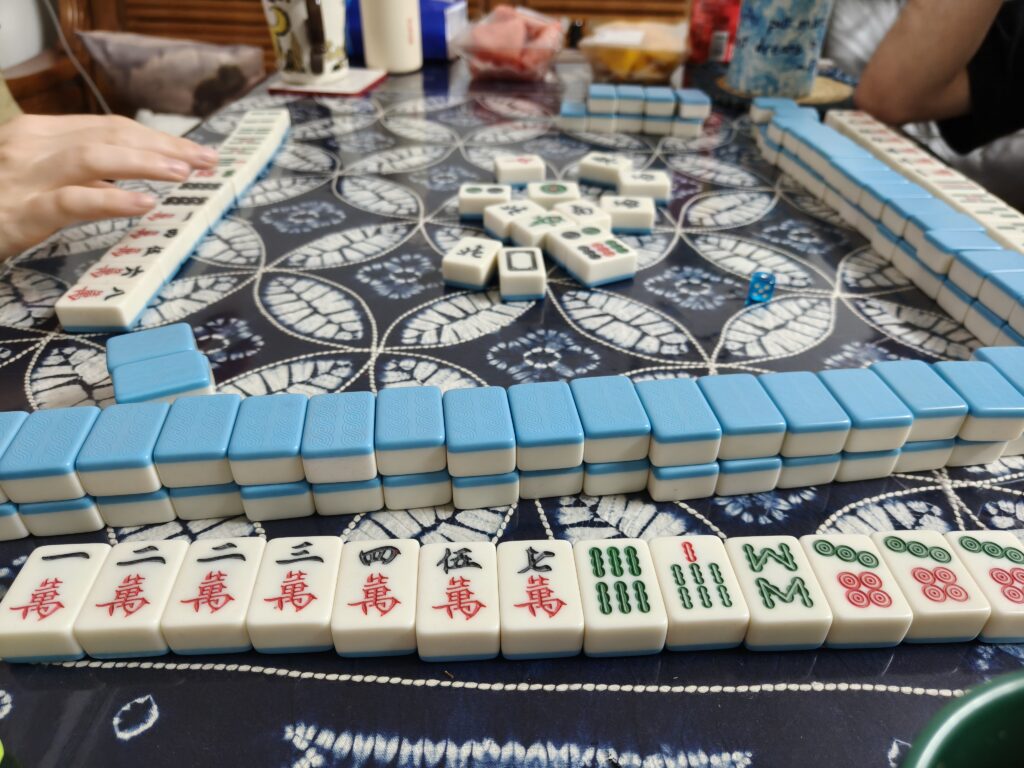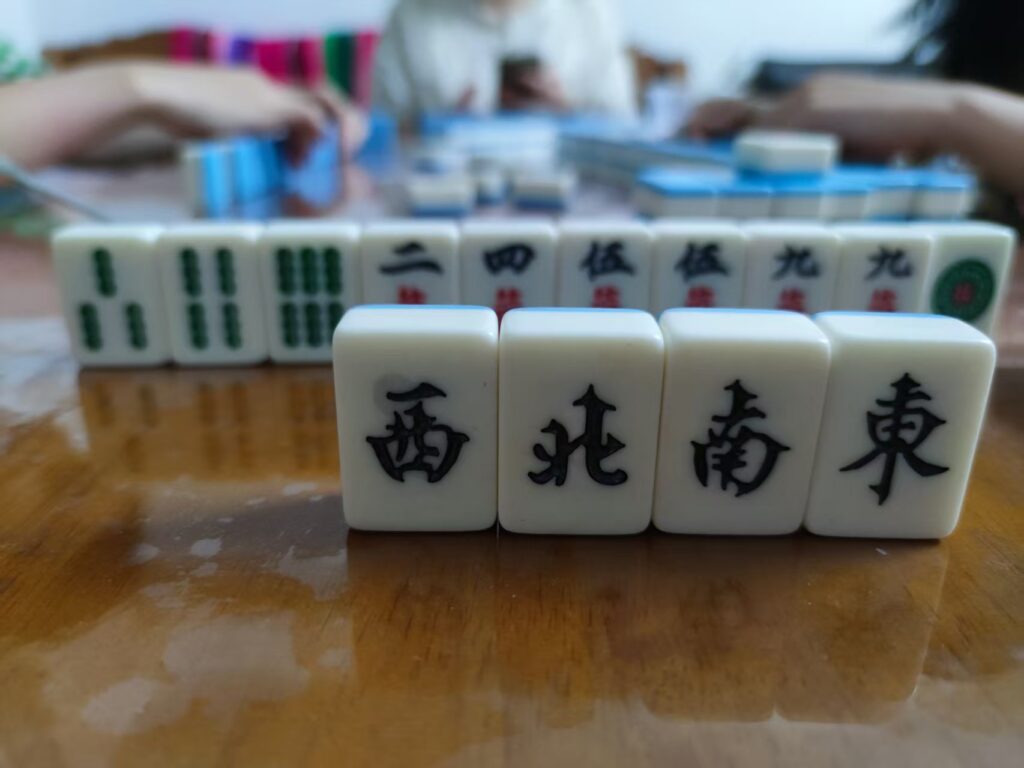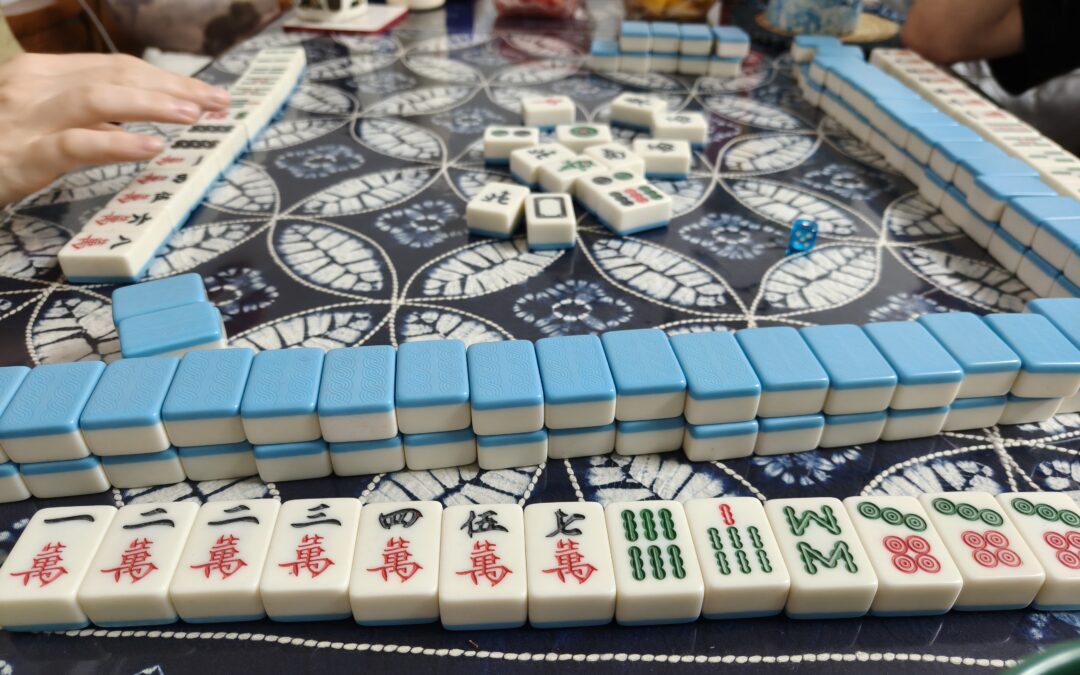I love playing games, and Mahjong is no exception. During my first year in China, two of my students approached my friend Megan, and me.
“You guys have to learn how to play Mahjong, and we will teach you.”
“Ok, sure!” Our first year in China, Megan and I were almost always up for an adventure.
Our students had a miniature set of Mahjong, and we met at a little fruit shop and sat outside. We spread out the tiles on the unstable wooden table and pulled our pink plastic chairs close while our students explained the rules and what the tiles meant.
The game is similar to Rummikub or Phase 10. Each person (usually 4 people, although it can be played with 3) has 13 tiles, and you draw a tile at the beginning of each turn and discard one at the end. The goal of the game is to have 4 sets or runs of 3 and one pair of tiles that are the same.
One of the hard parts of the game is reading the characters for the directions (these are called winds in the game). You also need to be able to recognize the characters for the numbers. There are a few other tiles to memorize, but we could figure out most of the others by counting the objects (sticks or circles) on the tiles.


I bought my Mahjong set from a yard sale type activity when I lived in Hainan. Students who were graduating could sell things they didn’t want, and I bought the Mahjong set for 50 kuai (about $8 at the time).
Since Mahjong is made from tiles, the complete set is pretty heavy, but I mailed it to Guangzhou when I moved here, and I have kept it through several moves while I’ve been in Guangzhou also. Keeping it for so long and through so many moves is probably not the wisest, but I’m thankful to have a piece of Hainan with me that I still use. To buy a new set would be about 100 kuai now. But I like my trusty old set.
Over the years, I have played Mahjong in many places. Different locations also have different rule variations, so usually before playing, we have to confirm the rules with the other people. When I visited a friend’s family in Henan during the Spring Festival one year, we would spend hours and hours and hours playing Mahjong. I don’t like doing the same thing for so long, but it was a great alternative to watching TV or sitting in my room, so I enjoyed those long periods of playing Mahjong. I think the longest I played at one time was around 7 hours. Although I at this point, I can’t remember if that’s an exaggeration and it was more like 4, or if it really was 7 hours.
Most of the time, when I play Mahjong with friends, we talk while we play. But when I first started playing with family members who couldn’t speak much English, I had to focus on my pieces and the game because I was much slower than most Chinese people who play. I felt a lot of pressure to decide quickly about which of my tiles I should keep and which I should discard. As I did this, I realized that Mahjong has some significant life lessons.
One of the biggest lessons that I have learned from Mahjong is that you have to make the best decision that you can in the moment and then live with the consequences. Sometimes, as I’m playing, I get down to the point where I only need one more tile. But since you can only keep 13 tiles, and you need the 14th tile that you draw to win, sometimes, you are faced with the difficult decision of getting rid of one of the tiles in the hope of finding a pair.
There are lots of strategies for which one you should keep—you can check the middle to see which ones have already been discarded, or you can guess which one other players are most likely to have kept, but ultimately, you just have to make the decision. And sometimes, you make the decision and discard one of the tiles and several minutes later, you draw that same tile. If you had kept the other one, you would have won. I have done this multiple times.
When I pick up that second tile, I can berate myself in anger and frustration, or I can lay down that useless tile, hoping that I can get the one I need the next time. Life is the same way. We make the best decisions that we can with the information that we have, and then we have to live with the consequences.
Maybe we take a job that seems great, but it turns out to be less than what we wanted. Maybe we agree to an activity and then later someone invites us to something that would have been much more fun. Maybe we take a trip to see the Great Wall of China, and the two days that we are there happen to be the two days that the wall is closed because of incredibly strong winds (I plan to write about this trip eventually, but as of now, I have yet to see the renovated Great Wall).
Maybe we choose a day for an outdoor wedding and in the course of about two weeks before and after that day, the weather is perfect and beautiful, but the day of the wedding is rainy and misty and an hour before the wedding, it starts pouring. You move the wedding inside because the instruments are in danger of getting wet and as soon as you start the ceremony, the rain clears up (this happened to my friend). In life, we make decisions with the information that we have, and when things don’t go the way that we want, it’s so easy to get frustrated.
In Mahjong, the stakes are pretty low. I don’t like to play for money, so basically, my competitive nature is the only thing that suffers. But that feeling of frustration is similar if I’m playing a game of mahjong or if I make a decision in life that doesn’t go the way I hope.
I have a couple of response options to these situations: in life or in Mahjong. I can be frustrated that things didn’t turn out “right.” Or I can accept that while the situation is a bit frustrating, those things happened for a reason and I can recognize the frustration, accept the situation as part of life and something that God has for me in this moment, and move on.
That process might look different in a game of Mahjong than it does when I’m dealing with a job that I don’t enjoy (p.s. I love my job right now, and I’m so thankful for it! Especially after having jobs that are not my favorite.), but the principle is the same.
I love games that teach me life lessons, and while a lot of games can teach us this lesson, I have seen it again and again when I play Mahjong.
Have you learned any life lessons from games?


I love this post and the connection to the decisions in life. We need to play mahjong more 😉
Hahaha, good take-away! Yes, let’s